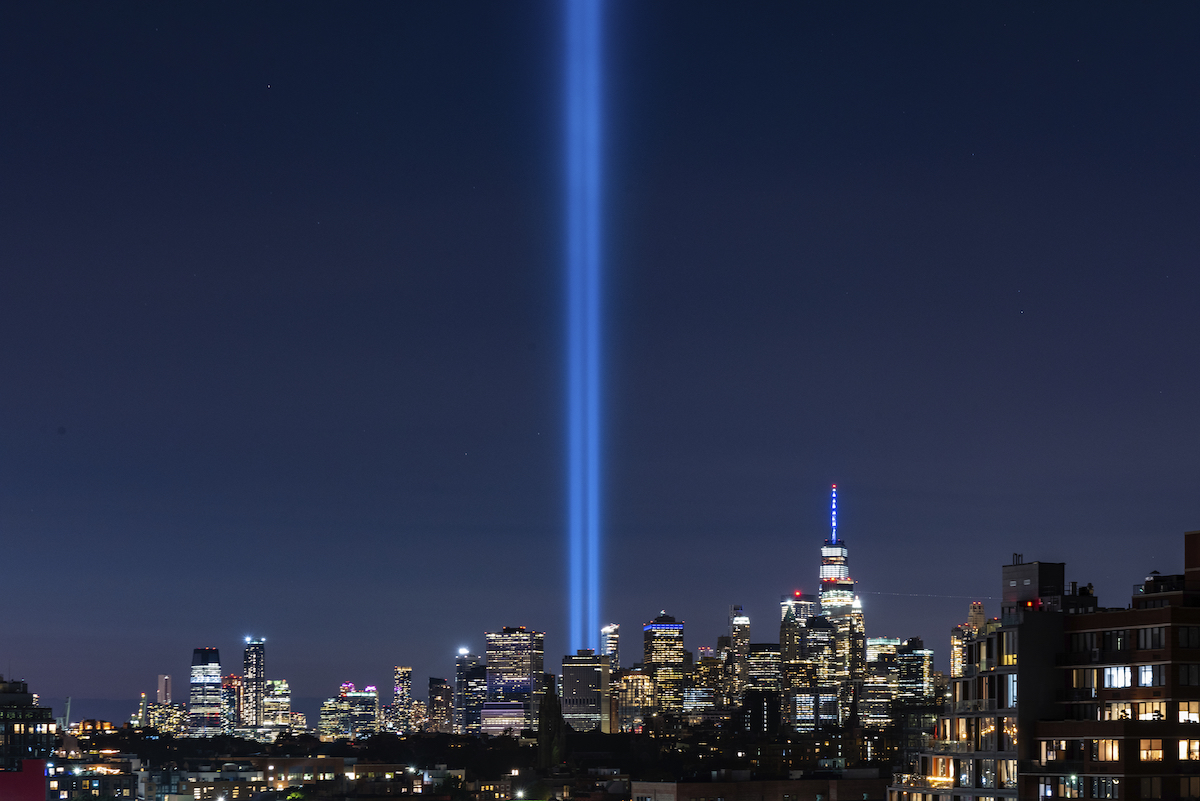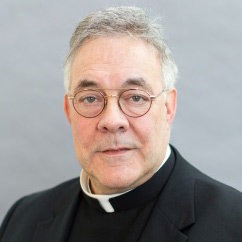It feels strange to type that it’s been 20 years since 9/11. What happened 20 years ago forced us all to reckon with the expansive scope and seemingly endless depth of evil. In the midst of something so heinous, so diabolical, can the hand of the One whose finger is said to write straight with crooked lines be detected?
As the stories of the orphans and their grief stricken have been told and retold, whether in our national media or in our kitchens, there remains an uncomfortable question: Why?
It is not that a simple and straightforward explanation from heaven itself would heal the wounds that we bear. Yet the question of why evil exists is one that weighs heavily on many hearts always and once again on this sad anniversary.
No full answer, in the form of a sentence or a proposition could ever satisfy the question of why evil exists, even if it were to drop from the sky. The ultimate answer, which does come to us from heaven itself, comes not in the form of words, but a Word, and more specifically, the Word that was made flesh (cf. John 1:14). That final answer is not a proposition, but a Person, and the embrace of One whose comfort is beyond our present understanding. The ultimate answer then, is a mystery: the mystery of encounter and embrace.
That the ultimate answer is a mystery does not mean that there are no proximate answers: Among the proximate answers is the fact that human freedom, so highly prized by all people, is also at the heart of evil. In a world whose history is so frequently acquainted with totalitarian experiments, one would be tempted to think that freedom, standing alone, was its own good. Yet, to see the heart of darkness as the world saw two decades ago is to understand that mere men, for certain twisted reasons, chose to exercise their free will to destroy the freedom and lives of others.
Thus, freedom, as indispensable as it is, is not sufficient for constructing the quality of society and culture appropriate to man, his dignity, and his capacity. It must be a freedom oriented to something beyond itself, as we have said so many times, oriented to Truth: the truth of man’s origin, the truth of man’s nature, and the truth of man’s destiny.
That is why the Acton Institute was founded, and why its mission is to study and promote both the transcendental reality of man, and his necessary freedom; or, as we state it, “religion and liberty” and ‘the free and virtuous society”. A clear understanding of the proper relation between religion and society has never been so needed in our world as it is today.
9/11 revealed a dimension of American society that some have attempted to shield from our view, and that in the intervening years seems faded from our memory. We discovered then that, at its core, America was a profoundly religious nation, and that faith in the American experience need not be a source of division between Americans but can be the foundation of our unity on shared principles. To lose sight of that truth will be the ruin of the great contribution America can make to the world.
Additionally, we know that when all of us, including political leaders, speak openly about our faith, it need not violate anyone’s conscience, much less shred the Constitution, as so many pressure groups argue. Rather, it gives rise to reflection on America’s highest and noblest aspirations and what ought to be the noblest and highest aspirations of any people. We have found that love of freedom and the embrace of faith are not incompatible; instead, they are bound up with one another, each reinforcing the other in perfect harmony.
Twenty years ago, I had hope that the events of that horrific day would represent a sea-change in the way our society views the place of religion. Back then, there wasn’t a public figure who addressed the attack on the nation without a plea for prayer for the victims. Many referred to the religious roots of the Western idea of human rights, one of the things so antithetical to the terrorists’ conception. Many public spokesmen then, including the president, sought God’s blessing on our people and the aspirations of our nation. Prayer vigils had been continuous. Indeed, it is difficult to even imagine dealing with that a crisis on that scale without our faith.
At the time, in a moving meditation, President George W. Bush expressed a vigorous faith by quoting St. Paul:
“As we’ve been assured: Neither death nor life, nor angels, nor principalities, nor powers, nor things present, nor things to come, or height, nor depth can separate us from God’s love. May he bless the souls of the departed, may he comfort our own, and may he always guide our country.”
But I sometimes wonder: Had the president made these remarks one week earlier, would there have been an outcry, as there was during the election, when he shared his faith experience with some prayer groups? Might he have been called a theocrat and worse? As it is, his unabashed faith, relentless during the presidential campaign, was seen has a great sign of leadership. Indeed, it is.
But today is another story, where we find ourselves severely divided as a nation, to the extent that the mere citation of a Scripture passage or earnest expression of faith would deepen the divide. It fills me with sadness.
How tragic that it took a calamity on the scale of what we saw on Sept. 11, 2001, to impart this message and reveal the religious truth beneath the secular pretensions. But there is even more going on here. As a nation, we have always grounded our belief in human rights in a fundamentally religious idea: Human life is sacred because it has an origin in the eternity of God’s grace and possesses a destiny in His love. It is because human beings are created in the Image of God that we know that heinous actions of diabolical fanatics are crimes of such magnitude.
From the Declaration of Independence through the movement to abolish slavery to the Civil Rights Movement, faith has been at the core of every event of any magnitude. Usually, that faith is invoked in defense of the sanctity and dignity of the human person, and against those who would violate it. This is as it should be.
As for those who hate modern life, made possible by this vision of the human person, the choice of the World Trade Center, symbol of global free markets, was no accident. If one hates human life, one also hates the products of human creativity, and hence what better target could have been selected?
These are the irrational cries of the forces of repression and bondage that hate and fear liberty, human enterprise, modernity, and ultimately, human life itself, and are mimicked by some even today. Thankfully, such forces are doomed to failure because the logic of their culture of death leads to self-immolation and destruction, whereas the logic of a rich and healthy culture of life leads to replenishment, creativity, and growth.
This, then, becomes the challenge for those of us living in the post-Sept. 11 world: Will we come to see our success, prosperity, creativity, and liberty as all being a means to a higher end? Will the awareness of our transcendent reality form our day-to-day decisions and our path as a nation? And from the perspective of the Acton Institute, so concerned as we are about cultivating a religious leadership that comprehends the moral potential of human liberty and enterprise, the critical question becomes: Are our clergy prepared to speak, in so intelligent, bold, and confident a manner, so as to invite the spiritual and moral renaissance for our society so desperately yearns?
It is a commonly held view that faith is somehow less necessary in times of peace, prosperity, and security – that living in a society of plenty diminishes the longing for spiritual solace.
We know from our own experience that we are more likely to turn to God in difficult times than easy ones. God speaks to us with a megaphone in our pain, C.S. Lewis said, because it is when we reach the end of the rope, not when we feel ourselves to be Masters of the Universe, that we are most likely to fall on knees in supplication. My pastoral experience suggests that personal trial is a prime motivating source to seek spiritual comfort and the forgiveness of sins.
At the same time, it is an error – perhaps the fundamental error – of the terrorists to believe that faith and prosperity are always inversely related. Part of the challenge of living a life of faith is to maintain a certain spiritual equilibrium in good times and bad, not to be tossed about by the winds of circumstance, flitting between bouts of depravity and sanctity, but rather seeking devotion as a daily practice.
One can hope that in this somber reflection we can retrieve a tolerance for open expressions of faith. Let us hope that the abiding smirk will be permanently wiped off the faces of the cynics of faith and freedom, who have too long occupied a central place in our culture.
Let us regard faith as a source of strength, comfort, and blessing to us as individuals and as a nation, the source and summit of our freedom, its barometer and compass.

